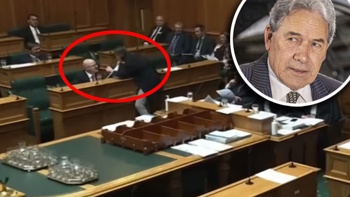

A young man who filmed himself and an underage girl having sex and then posted it on Snapchat is worried about being humiliated and embarrassed if his name is published.
The High Court has today dismissed his appeal against an earlier decision by the District Court to deny permanent name suppression.
But NZME still cannot name him as his lawyer has indicated he plans to lodge a further appeal.
The 21-year-old was denied permanent name suppression when he was sentenced in the Nelson District Court early last December on charges of unlawful sex with a minor and posting his exploits to a Snapchat group titled Lads Night.
His appeal was heard in the High Court at Wellington this week, when through counsel he raised concerns about the harm to his reputation from the consequences of being named.
The defence argued his hopes of advancing in his desired professional career were already dashed by his “immature and inexplicable showing off” that had led to a conviction.
“It’s apparent this one mistake will remain over a long time,” lawyer Steven Zindel said.
His argument was that the judge failed to consider that publication could risk his rehabilitation and ability to reintegrate into the community and that the element of personal deterrence was absent in this case and therefore publication would not prevent reoffending.
He also argued that the judge failed to properly take into account the appellant’s youth and the impact of publication on his father’s employment.
The Crown, as respondent, opposed the appeal and said the judge made no error in her assessment of the evidence or in finding the threshold of extreme hardship was not met.
Jackson Webber for the Crown said the appellant had subjected the victim to publicity on the internet and was now seeking protection from embarrassment.
“She left Nelson because of it,” Webber said.
/cloudfront-ap-southeast-2.images.arcpublishing.com/nzme/Y26VGIQ6PVFMFMT3IRMKWWXBMI.jpg) Judge Jo Rielly said in sentencing the defendant that the argument for permanent suppression failed to meet the threshold test on two grounds. The High Court agreed.
Judge Jo Rielly said in sentencing the defendant that the argument for permanent suppression failed to meet the threshold test on two grounds. The High Court agreed.
The man, who was 19 at the time and had just left school, was sentenced to 11 months’ home detention on charges including unlawful sexual connection with a person under 16, knowingly making an objectionable publication, possessing and knowingly distributing an objectionable publication - namely a video of him having sex with a girl under 16, plus three charges of supplying alcohol to a minor.
He had plied a 15-year-old girl with vodka and got her so drunk she barely understood what was happening. He then had sex with her and posted his exploits to a Snapchat group titled Lads Night.
He also posted the video to his Snapchat story feed, which was broadcast to all of his followers, but said this was accidental and deleted it once he realised what he had done.
Justice Peter Churchman said in the High Court this week it was “somewhat ironic” that the appellant had subjected the victim to the publication of material that must have been extraordinarily embarrassing, but felt that suppression of his name was justified because he was concerned about publicity.
In the District Court, Judge Jo Rielly said the argument for permanent suppression failed to meet either of the threshold criteria needed, including the extreme hardship or discretionary tests.
Defence lawyer Alec Sacheun argued that at the time the defendant was only 19, and, while he may have been boastful, it was clear he hadn’t thought through the consequences of his actions.
He said “publication would follow him around, especially on social media”, and that the defendant’s father, who had the same, unusual surname, was innocent in all that had occurred.
Sacheun argued this was relevant to the hardship test because the defendant’s actions went against his father’s own “rigid honour code” and publicity might mean he would be forced to resign from professional and community positions he held.
“The worst thing about the internet is that everybody knows,” Sacheun said.
He added that just because the defendant had breached the victim’s privacy did not mean he had abandoned his own right to privacy.
Judge Rielly said the first part of the defendant’s argument fell “far short” of the extreme hardship threshold.
She said the defendant’s father formed the second prong of the application, and, despite his concerns about any possible reputational damage, the grounds of extreme hardship were not met.
“It’s important for me to note that the concerns he has expressed are genuine and honestly held by him.”
Justice Churchman said the judge did not err in finding that publication of the appellant’s name would not cause his father to suffer extreme hardship.
Webber said last December that the court risked being faced with more young defendants claiming extreme hardship through being vilified as a result of names being published when embarrassment was a consequence that flowed from offending.
He said this week that despite claims from the defence of the potential for the defendant to be victimised beyond normal embarrassment through being identified, there was no evidence to support that.
“He’s still in the job he was in at the time, and still doing the course he was doing,” Webber said.
Justice Churchman said the District Court judge did not err in her finding that the threshold for suppression of the appellant’s name was not met, therefore consideration of the discretionary stage was unnecessary and the appeal was dismissed.
Tracy Neal is a Nelson-based Open Justice reporter at NZME. She was previously RNZ’s regional reporter in Nelson-Marlborough and has covered general news, including court and local government for the Nelson Mail.

Take your Radio, Podcasts and Music with you









